How Reclaim Waste can Save You Time, Stress, and Money.
How Reclaim Waste can Save You Time, Stress, and Money.
Blog Article
Some Known Questions About Reclaim Waste.
Table of ContentsReclaim Waste Can Be Fun For EveryoneFacts About Reclaim Waste UncoveredThe Ultimate Guide To Reclaim WasteSome Known Details About Reclaim Waste Reclaim Waste Fundamentals Explained
Domestic sewer waste refers to the waste and items from a property septic tank. The proper administration and disposal of residential sewage waste need fluid waste to be transferred to a sewage therapy plant where the proper techniques and tools are applied to cleanse and dispose of waste.
Business waste commonly consists of potential dangers, such as flammable products or a mix of fluid and strong waste products, and needs an extra advanced and in-depth disposal procedure. The disposal of commercial waste normally entails the filtration of waste before transportation to make sure secure and proper disposal. Industrial waste is developed from byproducts and overflow of industrial processes and production.
This type of waste can not utilize the very same sewer monitoring transport or procedures as septic or commercial liquids. The industrial waste administration procedure calls for the inspection and testing of liquid waste before it goes through the disposal procedure (liquid waste removal melbourne). Runoff waste is the liquid waste that comes from runoff and excess stormwater in highly populated areas or cities
Runoff waste can cause contamination and flooding if not taken care of effectively. Making sure proper waste monitoring can protect against catastrophes and reduce ecological damage.
5 Easy Facts About Reclaim Waste Explained
Contact PROS Solutions today to learn more about our waste monitoring and disposal services and the appropriate means to take care of the fluid waste you create.
(https://reclaim-waste.jimdosite.com/)Do you know what takes place to your water when you disengage, purge the bathroom or drain pipes the washing machine? No? Well, it deserves knowing. This supposed 'wastewater' is not only an essential source but, after therapy, will be launched to our land, waterways or the ocean. Used water from bathrooms, showers, baths, kitchen area sinks, laundries and industrial procedures is understood as wastewater.

water used to cool down equipment or clean plant and tools). Stormwater, a form of wastewater, is drainage that flows from farming and urban areas such as roofs, parks, gardens, roadways, paths and gutters into stormwater drains pipes, after rain. Stormwater flows without treatment directly to local creeks or rivers, ultimately getting to the sea.
Reclaim Waste Fundamentals Explained
In Queensland, many wastewater is treated at sewage treatment plants. Wastewater is moved from domestic or industrial sites through a system of sewers and pump stations, called sewerage reticulation, to a sewer treatment plant. Local governments develop, keep and operate most sewage therapy plants. Operators are licensed under the Environmental Security Act 1994 to discharge treated wastewater at an appropriate ecological criterion right into waterways.
The Division of Natural Resources suggests local governments concerning handling, operating and maintaining sewage systems and therapy plants. In unsewered areas, local federal governments may require owners to mount private or household sewer treatment systems to treat residential wastewater from toilets, kitchens, restrooms and washings. The Division of Natural Resources authorises the usage of family systems when they are verified to be efficient.
Many stormwater receives no therapy. In some new communities, therapy of some stormwater to remove trash, sand and gravel has actually begun making use of gross contaminant catches. Wastewater treatment occurs in 4 phases: Eliminates strong matter. Bigger solids, such as plastics and other items wrongly released to sewers, are eliminated when wastewater is passed through displays.
Uses small living organisms understands as micro-organisms to break down and eliminate staying liquified wastes and great particles. Micro-organisms and wastes are integrated in the sludge.
Excitement About Reclaim Waste
Nutrient removal is not available at all sewer therapy plants due to the fact that it calls for costly specialist devices. It is ending up being a lot more typical in Queensland. Clear liquid effluent produced after treatment might still consist more helpful hints of disease-causing micro-organisms. If this effluent is released into waterways such as rivers or the sea, the micro-organisms will eventually die out.

This typically suggests wastewater needs to be treated or impurities eliminated before it can be released to waterways. Most wastewater moves into the sewage system. Under the Act, city governments carry out approvals and permits for ecologically relevant tasks (ERAs) including wastewater releases that may have a local influence. The department carries out approvals and permits to ERAs entailing wastewater releases that may have a regional or statewide effect.
An Unbiased View of Reclaim Waste
Otherwise, samples are considered research laboratory evaluation. Typically several examinations are needed to develop the levels of each of the different contaminants such as oils, hefty steels and chemicals in water. Surveillance gives factual information about water quality and can confirm that licence conditions are being met. The information acquired with tracking offers the basis for making water high quality decisions.
Report this page